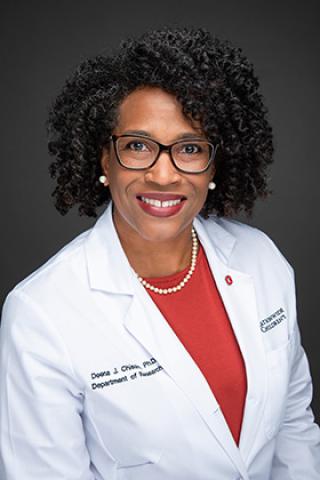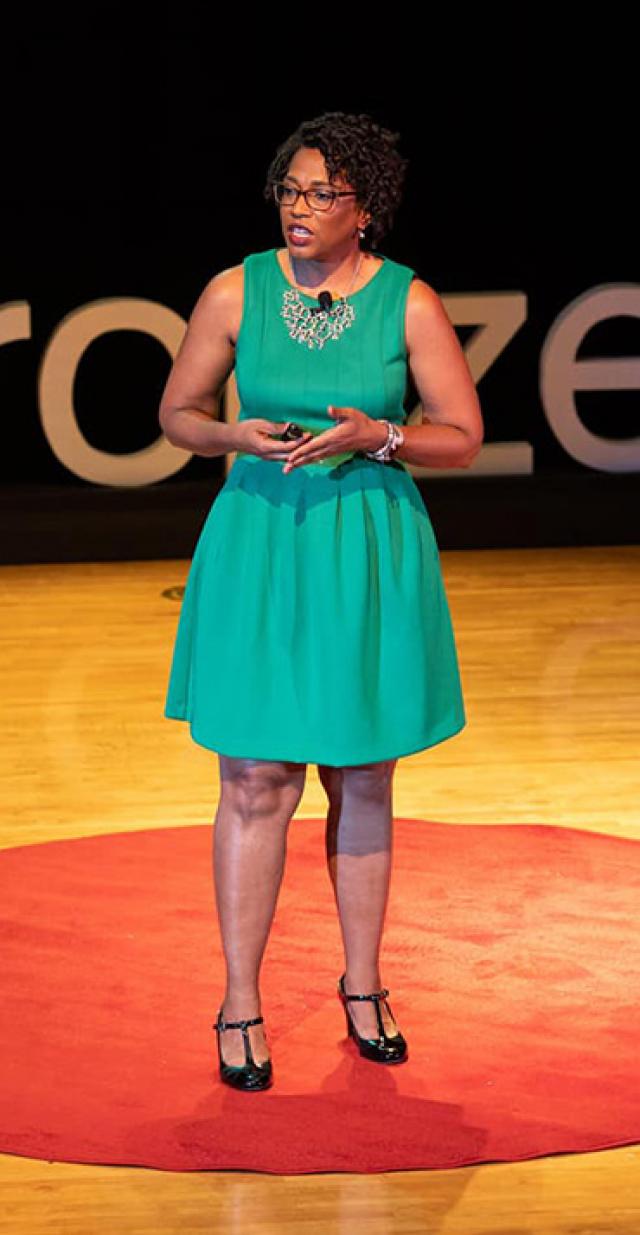
Chisolm honored as a 2021 YWCA Woman of Achievement
Congratulations to Dr. Deena Chisolm, researcher at Nationwide Children’s Hospital and professor at The Ohio State University, for being selected as a 2021 YWCA Woman of Achievement. Learn how Chisolm achieved her leadership roles and what advice she has for other women who are working to advance.

The YWCA Woman of Achievement award, which has been given to honor central Ohio women for more than 30 years, is granted to nominees, such as Dr. Deena Chisolm, who demonstrate a deep commitment to breaking down barriers and creating opportunities for women.
Changing our health care system, helping communities, and educating children on health literacy is Dr. Deena Chisolm's mission. She feels that she found her niche with her career path that includes the perfect blend of health care, math, statistics and engaging directly with communities in need.
Dr. Chisolm is an internationally recognized health services researcher studying health and healthcare outcomes for at-risk adolescents and families. She is the Nationwide Foundation Endowed Chair in Health Equity Research, serves as founding director of the Center for Child Health Equity and Outcomes Research, and vice president for Health Services Research in the Abigail Wexner Research Institute at Nationwide Children’s Hospital. She is also a professor of Pediatrics and Public Health at The Ohio State University.
Her research focuses on improving health and healthcare for children and families with over 80 peer-reviewed publications on pediatric health services, outcomes, and disparities. Her current projects explore how health literacy, health policy, and social factors influence the health of at-risk adolescents transitioning to adulthood.
She is the immediate past chair of the Ohio Commission on Minority Health and serves as a board member for the Health Policy Institute of Ohio.
Chisolm enjoys mentoring young people, particularly young women of color, about possible future careers in health care. She wants to help people see they can work in health administration and research and all those other spaces as well. She also offers guidance and feedback to medical students as a faculty member in the Ohio State College of Medicine's Medical Scientist Training Program Mentor Academy. In addition, Dr. Chisolm has mentored pre- and post-doctoral fellows and junior faculty including service as primary mentor on an NHLBI K-award.

Chisolm's personal commitment to addressing racism as a public health crisis is grounded in her lived experiences: as a Medicaid-enrolled youth struggling with chronic illness in a culturally insensitive health care system, as a family member of young black men whose safety is constantly at risk from the people charged with keeping them safe, and as an African American health researcher, obligated to pointing out why race matters when she's often “the only one in the room.”
Her commitment is also grounded in her recognition of structural racism – in our education system, in our criminal justice system and in economic systems. As director, she is excited to work with other faculty in the Center for Innovation in Pediatric Practice and with leadership in the Abigail Wexner Research Institute to more formally include research on health equity and minority health in the institution’s research priorities.
This means conducting research on how racism and other social factors drive health disparities in children; measuring and monitoring disparities in care within the institution; implementing and testing interventions designed to close the gaps; ensuring that all research in the institution reflects the diversity of the populations they serve; and providing a training ground for the next generation of diverse health researchers who will continue this important work.
Research is her voice for change.
The Women's Place asked Chisolm the following questions to learn how she achieved her leadership roles and what advice she has for other women who are working to advance.
Note: Responses have been lightly edited for style.
Which personal/career accomplishments are you most proud of, and why?
Professionally, being promoted to full professor with tenure in the OSU College of Medicine was a particularly proud moment. It was an important recognition of my career as a researcher, an educator, and an advocate for health equity in children. It allowed me to serve as a model for women and women of color on the tenure track. It can be done.
Aside from the obvious hard work and dedication, is there anything else you attribute your career success at Ohio State to?
I have built amazing relationships with faculty members at OSU though my time as a student and as a faculty member. These partnerships allowed for collaborations on papers, grants, and presentations that strengthen my work, pushing my scholarship beyond my core skills and interests.
What does it mean to you to be a YWCA Woman of Achievement?
Each year that I have attended the luncheon I have been inspired by the honorees. Joining the women of the “academy” places me in an amazing circle that I am excited to engage with in the years to come.
What advice would you give to other women looking to advance their careers at Ohio State?
I encourage women to be open to new collaborations across colleges and across disciplines. Think big. Build a personal and professional team beyond your department that supports, celebrates, validates, and pushes you.
How can we empower women to seek leadership roles at the university?
Rather than empowering women to seek leadership, let’s empower our university to seek women leaders. We know that many women suffer from imposter syndrome and question their readiness for the next. We need leaders at each level to mentor, coach, and sponsor earlier career women to believe in their worth and their ability.
What would you like to see for the future of women at Ohio State?
I want to see women doing whatever fulfills them. I want our approach to work as a university be that we value each women’s contribution. There is no one definition of success and our academic and professional systems need to reward all of the paths that further our university and our society.